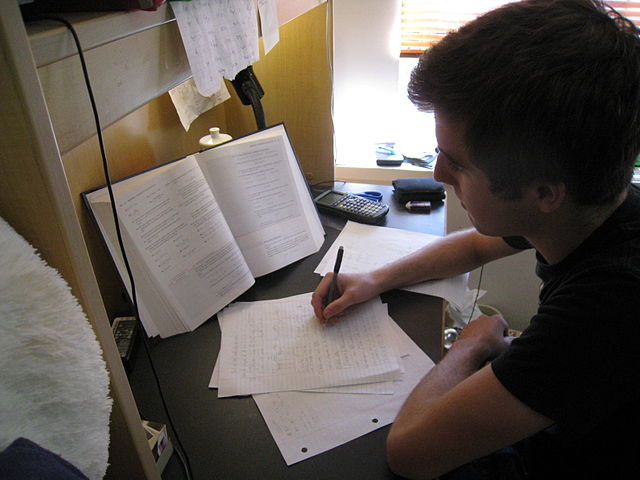How to Practice for the Act Reading
Introduction to vii Best ACT® Reading Strategies
Dorms, tardily classes, new friends, and possibly even a new location! You lot have then many things to look forward to when getting ready for the transition to college, and you are in that crucial year where we know how hard you are working to get to university.
We want to make sure that you take the best college experience possible past getting into the schoolhouse of your dreams. Nosotros know what schools are looking for, and what they want to see from your standardized tests. One of those necessary (and sometimes dreaded) tests is the ACT®.
You've been a diligent worker bee when it comes to prepping for the Deed®, and we want to give you some specific Human activity® Reading strategies that will fix you for a loftier score and get you ane stride closer to your dream schoolhouse.
Nosotros've boiled information technology down to the top seven reading strategies. Hither's the lowdown:
1. Read Each Passage Earlier its Questions.
Be sure to pace yourself – don't read as well slowly since yous desire to manage your fourth dimension; even so, don't read so speedily that you lot forget the data.
Underline words that stand up out to yous, and make notes in the margins with the chief ideas. When reading, enquire yourself the following questions:
a. What is the principal idea/point of this passage?
b. Who are the main characters?
c. What are the top two-3 arguments of this passage?
PRO TIP: Afterwards reading each paragraph in the passage, jot down 2-iii words underneath that summarize the idea of that paragraph. This not only helps you lot to recollect the information, but also helps y'all to form a single thought most the passage and salve you the time of re-reading when answering the questions.
Many students find it helpful to read the quick blurb or introductory line at the superlative of each passage. It gives an overview of the passage'due south main idea and grounds you in what to expect from that writer in this particular context.
It'due south important to think that these passages will exist pulling from the following subjects:
- Humanities (art, dance, music, compages)
- Natural Sciences (biology, chemistry, physics, medicine, beefcake)
- Social Studies (business, economics, educational activity, history)
- Literary Fiction (short stories, novels, memoirs)
A quick overview of what to expect from the questions for each passage type:
Humanities: Think TONE
Being that Humanities focuses on the arts, these questions are more likely to lean towards asking you about the author's voice or the feeling that the writer is trying to evoke from the reader.
Natural Sciences: Think DETAIL
The study of natural sciences is backed upwards by prove. Take a similar bear witness-based approach when thinking about the answers to these questions. When y'all meet a question request you to find a argument in the passage to back up the answer, that is a giveaway Natural Sciences question.
Social Studies: Retrieve SUBJECT/Signal OF VIEW.
Social studies embrace the world of psychology and sociology. What do we know nigh the field of psychology? It is based on how people think, and why they do and then. Think this when encountering a social studies question. The question volition ask what you think the writer would hold with, or substantially, the main subject/thought of the passage.
Literary Fiction: Think THEME.
Since the literary fiction passages volition be memoirs or something similar, think about the idea behind the thought. What is the bigger motion picture here? If you could eddy down this passage into i statement summarizing the big idea, what would it exist? Thinking near the large picture will assist you when answering literary fiction questions.
2. Read the Questions 2nd.
After you've taken the time to read for understanding and jotted down some quick notes most the main idea, go over the questions one-by-one using these techniques:
- Answer the questions that are easiest and that you feel yous tin can answer confidently without reviewing the passage.
- Circle any questions that you are having trouble with then that yous can skip them for now and come back to them.
- When reviewing an private question, employ the process of elimination to narrow your answer choices to the well-nigh probable possible answers.
PRO TIP: Examine questions for keywords (words that stand out to you lot). This will permit y'all to more than easily find the answer when reviewing the passage.
Pay attention to "line" questions that brand reference to specific parts of the passage. For example, line questions may start out with "In lines 4-5, what did…?" These questions should be quicker to answer, and will let you to spend more fourth dimension answering more than hard questions.
iii. Manage Your Time Effectively.

Bring a lookout man so yous tin continue a close heart on the amount of time you're spending reading and answering the questions for each passage. Try to take no more than than 8-ix minutes on one passage.
Timing breakdown: iii minutes reading + five minutes reviewing/answering questions= 8 minutes per passage
If you are spending more than 9 minutes on one passage, movement on to the next one and come back to information technology.
If you stop early, go dorsum and cheque each passage for any questions that you skipped.
PRO TIP: Circumvolve all of your answers in the question volume. Once you lot've done then, make sure you transfer all answers yous circled to your respond canvas.
four. Put Yourself Ahead of the Game.
Most ACT®-taking students do not become to all of the passages, and so it would give you a major advantage if you do. That would get y'all one pace closer to your score of 36!
However, y'all can only practise and then if you've managed your time effectively. Every bit we discussed earlier, you need to have a method of attack for reading passages and answering questions (keywords, underlining, etc) that is specific to the Act® Reading department.
PRO TIP: An additional method to save time could include predicting an answer to the question before reading the answer choices. Then, review the answers to come across which answer choices are in line with what yous had in mind.
Another tip is to do the passages in whatever order yous feel comfortable with! If y'all enjoy reading Literary Fiction the virtually, feel free to start with that passage and answer those questions get-go. If the Social Studies passage makes you nervous, save that passage for last so you lot accept more than fourth dimension to focus on and answer those questions.
v. Exercise with Many Tests.

You'll want to practise for the Human activity® Reading portion as much as possible to familiarize yourself with the testing format before the big 24-hour interval. Study the different passage types and subjects then you lot can spend less fourth dimension determining what field of study a passage falls under when it comes time for the test.
Case: If you are reading a passage nearly the life of Marilyn Monroe, it is condom to conclude that it is a literary fiction passage considering memoirs unremarkably fall into this category. Remember to remember about the overall theme.
Example:If you are reading a passage that starts discussing popular methods of agriculture, it is safe to conclude that you are reading a passage about the natural sciences. Remember to pay attention to detail.
There are many dissimilar methods you lot tin employ to prepare for the test, so take reward of the ones nigh convenient for you. Get to local bookstores to buy Human activity® Prep books or download resources from online. Accept the time to practise real tests and written report what your testing strengths and weaknesses are. Take at least 10 practice tests.
PRO TIP: Time yourself! Remember the timing strategy that we discussed earlier. Time how rapidly it takes you to read a passage for comprehension, and to review the questions. If it more often than not takes yous longer than ix minutes to move past one passage, continue to practice, exercise, and practice until you find yourself successfully adhering to your timing strategy.
6. Make Educated Guesses .
If you lot have referred back to your 2-3 discussion summaries of each paragraph, used process of elimination, and are all the same unsure of the answer, your best bet is to make an educated approximate.
If you lot've gotten rid of a couple answer choices, y'all have a better probability of picking the right one when you're choosing between 2 answers instead of 4! Remember the cues that were discussed in strategy i regarding what to await out for based on each passage blazon.
Context clues will also be helpful. Using the information surrounding words that you are unsure of will aid you to get a amend idea of the meaning of that discussion, besides as how to respond to it when used in a question.
7. Read, Read, Read!

A surefire way to make sure that you'll laissez passer the Human activity® Reading test with flight colors is to, well, READ!
Reading will constantly exist the virtually impenetrable Deed® practice there is. Build your reading and comprehension skills by reading as often equally you lot can.
Read magazines, books, manuals, etc. Try to read all types of book formats to familiarize yourself with different writing styles—not just the subjects that you enjoy most or are the well-nigh comfortable with.
In that location y'all take it, folks! The height ACT® Reading strategies for a high score that will take your dream school begging you lot to attend.
Did we miss whatever strategies on this list? Allow united states know!
Looking for Human activity® practice?
You tin can find thousands of exercise questions on Albert.io. Albert.io lets yous customize your learning feel to target practice where yous demand the nigh help. We'll give you challenging practice questions to help you lot attain mastery of the Act®.
Start practicing hither .
Are you a teacher or ambassador interested in boosting Deed® student outcomes?
Learn more than about our school licenses here.
Source: https://www.albert.io/blog/7-best-act-reading-strategies/
0 Response to "How to Practice for the Act Reading"
Postar um comentário